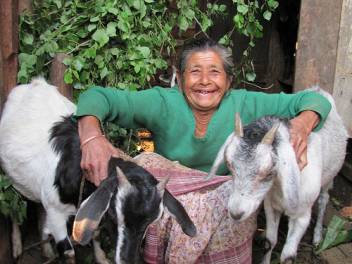 Yesterday, I had the honour of moderating the roundtable debate on ageing and disability with my colleague AK Dube of the African Decade of Persons with Disabilities, as part of this week’s meeting of the UN High-level Panel in Monrovia, Liberia.
Yesterday, I had the honour of moderating the roundtable debate on ageing and disability with my colleague AK Dube of the African Decade of Persons with Disabilities, as part of this week’s meeting of the UN High-level Panel in Monrovia, Liberia.
We were joined by colleagues from ageing and disability organisations from around the world; and two members of the UN High-level Panel: Amina Mohammed, the UN Secretary-General’s Adviser on post-2015 and Paula Caballero, Adviser to María Ángela Holguín, Colombian Foreign Minister.
Empowerment of all is crucial
Around the table there was a strong consensus that empowering all people from all groups should be a key part of the post-2015 framework. We discussed and agreed on the different types of empowerment we want the High-level Panel to take forward.
Social protection for all (including healthcare, pensions and support to those who cannot work) is increasingly being recognised as the best way to empower poor and marginalised population groups.
At the roundtable, civil society participants agreed that setting up social protection floors should be a key target in the post-2015 framework. Paula Caballero agreed, stating that: “We will be looking at how to implement social protection floors universally.”
We also discussed how the post-2015 process should ensure older people and people living with disabilities can participate in not only the process towards a new development framework, but also in national and international policy processes beyond 2015. We want a framework that generates empowerment through political participation – regardless of age and disability.
The data issue
I was happy to hear Amina Mohammed comment that: “All goals will apply to women, disability and age.” She emphasised the need for ageing and disability groups to be clear on additional investments needed for these groups and how to measure targets.
I completely agree and it is now our responsibility, as civil society organisations, to provide the panel members with the information necessary to build strong goals which include older people and people living with disabilities.
As a key part of this, we must ensure that the mechanisms used to collect data for the post-2015 framework are much more inclusive than those for the MDGs.
In Africa, we are struggling to find out how many older people are affected by HIV and AIDS, because all data collection for MDG 6 ends at age 49. As Africa (like the rest of the world) is ageing rapidly, this is simply a mistake we cannot repeat.
The post-2015 framework needs teeth!
Some sectors would suggest that the MDGs are a bit “toothless” because they don’t force accountability on governments. The High-level Panel must discuss how we can ensure that there’s more weight in the new framework.
As we look to the next High-level Panel meeting in Bali in March, which will focus on global partnerships and financing for development, this is an essential question to keep in mind.
What else are we doing?
To ensure our recommendations are heard in this process, we are engaging in a number of consultations:
- National consultations in at least 20 countries.
- Six thematic consultations including population dynamics, inequalities and health.
- The MY World initiative, a UN-led, global outreach programme.
- Participate, a UKAID-funded, participatory research project.
Learn more
- Read our ageing and disability briefing for the Monrovia meeting.
- Read our discussion papers on the post-2015 process.
- Follow the discussion on Twitter via the hashtag #post2015HLP.
